- Home
- Diana Palmer
Blind Promises Page 3
Blind Promises Read online
Page 3
The older woman was visibly relieved. “Oh” was all she managed to say.
“But I can certainly understand why my predecessors were in such a rush to get out the door,” she added with a grin. “He does have a magnificent temper, doesn’t he?”
Lorraine sighed. “Yes, he does. Blindness isn’t easy for a man like my stepson, you know. He is—was—so athletic. He especially liked water-skiing and snow skiing and aerobatics in his plane….”
The other woman was painting a picture of a man who had enjoyed a reckless life-style, as if he hadn’t considered life precious enough to safe-guard.
She frowned. “Dangerous sports.”
“Very obviously,” Lorraine said quietly. “He’s been that way since his wife died in the automobile wreck. He was driving, you see. It was many years ago, but he’s never been the Gannon he was when I married his father.”
“How old was he when you married?” she asked quietly, sensing a kindred spirit.
“He was ten.” She sighed, smiling. “His mother died when he was born, and his father went to his own grave loving her. I was a substitute. He cared for me,” she said quickly. “But not in the same way he cared for Gannon’s mother.” She turned away, as if her own memories were painful. “Is your room all right, my dear?”
“It’s lovely. I’ll enjoy it very much while I’m here. Mrs. van der Vere, exactly what is the problem with your stepson’s eyes? Mrs. Pibbs was rather vague, and I’d like to know.”
“That’s the problem,” Lorraine said as she led the way into her small sitting room and took a chair overlooking the rocky coastline. “There is no medical reason for his blindness. They call it—what’s that word?—idiopathic. Gannon’s doctor said that it could very well be hysterical blindness, brought about by the sudden shock of expecting to be stabbed in the eyes by those ragged wooden beams at the shore. The woman who was driving the speedboat lost control,” she explained. “Gannon was slung toward a dock with splintered boards. How it missed his eyes was truly a miracle, but he didn’t expect it to miss, you see. He was twisted and his head smashed into the dock. When he came to in the hospital, he was blind.”
“And he doesn’t like the idea of admitting that it could be hysterical paralysis of the optic nerve,” Dana concluded, pursing her lips. “That’s quite understandable, of course. Was there any emotional trauma in his life at about the same time?”
“Not that I know of,” the smaller woman commented. “Of course, Gannon is a very private person.”
Dana nodded. “Does he go out at all?”
“Socially, you mean? No,” she said sadly. “He stays in the living room and harasses his vice-presidents over the phone.”
“His vice-presidents?”
“At the electronics firm he owns, my dear. They manufacture all sorts of communications equipment—interfaces for computers, buffers, monitors, that kind of thing.” She shrugged and smiled apologetically. “I don’t pretend to understand; it’s far too technical for me. But the company’s introduced some revolutionary new system components, and apparently my stepson is something of an electronics genius. I’m very proud of him. But I have to admit, I have no idea exactly what he does.”
“I don’t know anything about computers,” Dana murmured. She smiled secretly. “But if I asked, he might be tempted to educate me. It might even break the ice.”
“Be careful that you don’t fall in,” Lorraine cautioned. “Gannon doesn’t particularly like women right now. He was almost engaged when the accident happened. The woman walked out on him.” She grimaced. “Perhaps some of that was guilt. She was driving the speedboat, you see.”
Dana pondered that for the rest of the day. Poor lonely man: His life hadn’t been any picnic so far, either. She smiled, just thinking about the challenge Gannon was going to present.
After letting him simmer all day, Dana took Gannon’s dinner tray in herself.
He was sitting in a deep armchair by the open window that led onto the balcony. Outside, the waves were crashing slowly against the shore.
He lifted his shaggy blond head when he heard the door open and close. “Mother?” he called shortly.
“Hardly,” Dana replied. She put the tray on the big desk, watching him stiffen at the sound of her voice.
“You again? I thought you’d gone home, Nurse.”
“And leave you all alone, Mr. van der Vere?” she exclaimed. “How cowardly!”
He lifted his chin aggressively. “I don’t need another nurse. I don’t want another nurse. I just want to be left alone.”
“Loneliness—take it from me—is bad for the soul,” she said matter-of-factly. “It shrivels it up like a prune. Why don’t you walk along the beach and listen to the waves and the sea gulls? Are you afraid of sea gulls, Mr. van der Vere? Do you have a feather phobia or something?”
He was trying not to laugh, but he lost. It rolled out of him like deep thunder, but he quickly stifled it. “Impertinent Miss Steele,” he muttered. “Your name suits you. Are you cold and hard?”
“Pure marshmallow,” she corrected, removing the lids from the dinnerware. “Just take a whiff of this delicious food. Steak and mashed potatoes and gravy, homemade rolls and buttered asparagus.”
“All my favorites,” he murmured. “What did you do, bribe Mrs. Wells to fix it? She hates the smell of asparagus.”
“So she told me,” she said with a smile. “But it was her night off. I cooked it.”
“You cook?” he asked curtly.
“I used to live alone. I’d starve to death if I didn’t. Now, if you can’t manage by yourself, I’ll be glad to spoon-feed you….”
He said something unpleasant, but he got to his feet and stumbled toward the desk.
She walked around it and caught his hand. He tried to free himself but she held firm, determined not to let him dominate her.
“I’m offering to help you,” she said quietly, staring up at his scowling face. “That’s all. One human being to another. I’d do the same for man, woman, or child, and I think you would for me if our situations were reversed.”
He looked shocked for a minute, but he stopped struggling. He let her guide him to his chair behind the desk. But before he sat down, his big hands caught her thin shoulders for a minute and moved upward to her neck and her face and hair. He nodded then and let go of her to drop into the big chair, which barely contained him.
“I thought you’d be small,” he said after a minute, groping for the cup of hot black coffee she’d placed within his reach.
“In fact, I’m above average height,” she returned. The feel of his warm, strong hands had made her feel odd, and she wasn’t sure she liked it.
“Compared to me, miss, you’re small,” he said firmly. “What color is your hair, your eyes?”
“I have blond hair,” she said. “And brown eyes.”
“An unusual combination.” He picked up his fork and managed to turn over the coffee with one sudden movement. A torrent of words poured out of him.
“Stop that,” Dana said sharply. “I’ll walk right out the door if you continue to use such language around me.”
“I must remember to search my mind for better words if it will get you out of my hair,” he said with malicious enjoyment. “Are you such a prude, little Nurse?”
“No, sir, I am not,” she assured him. “But I was always told that a repertoire of rude language disguised a pitiful lack of vocabulary. And I believe it.”
He appeared to be taken aback by the comment. “I’m a man, Miss Steele, not a monk. The occasional word does slip out.”
“I’ve never understood why men consider it a mark of masculinity to use shocking language,” she replied. “I don’t consider it so. Not that, nor getting drunk, nor driving recklessly….”
“You should have joined a nunnery, miss,” he observed. “Because you are obviously not prepared to function in the real world.”
“I find the real world incredibly brutal, Mr. van der Vere
,” she said quietly. “People slaughtering other people, abusing little children, finding new ways to kill, making heroes of villains, using sensationalism as a substitute for good drama in motion pictures…. Am I boring you? I don’t find cruelty in the least pleasurable. If that makes me unrealistic, then I suppose that I am one.”
“It amazes me that you can stand the company of poor weak mortals, Nurse, when you are so obviously superior to the rest of us,” he said, leaning back in his chair.
She felt the shock go all the way to her toes. “Superior?” she echoed.
“You do feel superior?” he mocked. “Have you never made a mistake, I wonder? Have you never been tempted by love or desire, greed or ambition?”
She flushed wildly and finished mopping up the coffee. “I’m hardly a beauty contest candidate,” she said curtly. “And even if I were, men frankly don’t interest me at all.”
He raised a curious eyebrow. “Venom from the little nun? Someone has hurt you badly.”
“I’m not here to be mentally dissected,” she said, regaining her lost composure. “I’ll get you another cup of coffee.”
“And I thought you didn’t run from the enemy,” he mused as she left him.
But she didn’t answer. She couldn’t.
The new environment and sparring with her patient had kept Dana’s mind occupied during the day, but the night brought memories. And the memories brought a gnawing ache. It was hard to believe that Mandy was gone. Sweet little Mandy, who could be maddening and endearing all at once.
She sat by the darkened window of her room and stared blankly down to where the whitecaps were visible even at night. Why did people have to die? she asked silently. Why did it all have to end so suddenly? All her life her mother had been there when she needed someone to talk to, to confide in, to be advised by.
The divorce had been no surprise when it came. The only unexpected thing was that it had taken so many years for her parents to admit that the marriage was a failure. Dana’s earliest memories were of arguments that seemed to last for days, interspersed with frozen silences. Fortunately she had had grandparents who kept her each summer, and their small farm became a refuge for the young girl who felt neither wanted nor loved by her parents. Even now, with her mother dead, nothing had changed between Dana and her father. She sighed bitterly. Perhaps it would have been different if she’d been the son her father really wanted. Or perhaps it wouldn’t have been.
She got up and dressed for bed. One thing was for certain, she thought as tears welled up in her eyes and spilled over: she was an orphan now. She might as well give them both up, because it was perfectly obvious that her father had no place for her in his life anymore. Her father’s remarriage hadn’t been such a trauma, because they hardly communicated in the first place. But to lose her mother so soon afterward, with the shock of Mandy’s confession that she was going to end it all because of her husband’s remarriage, was more than she could bear. There had been no time to adjust to either change in her life. No time at all.
She put out the light and crawled between the covers. Oh, Mandy. She wept silently. Mandy, why did you have to go and leave me alone? Now I have no one!
Tears soaked the pillow. She wept for the mother she didn’t have anymore; for the father she’d never had. For the future, all bleak and painful and empty. But there was no one to hold her while she cried.
The next morning Gannon was sitting on the balcony when she carried in his breakfast. The wind was ruffling his blond hair, lifting it, teasing it, and she wondered suddenly how many women had done that. He had wonderful hair, thick and pale and slightly wavy.
“Breakfast,” she called cheerfully, placing the tray on the table beside his chair at the edge of the balcony. The outdoor furniture was white wrought iron, and it fit the isolation and the rustic charm of the place.
Gannon half turned, and his pale gray eyes stared blankly toward her. His shirt, worn with tan slacks, had in its multicolored pattern a shade of gray that exactly matched his pale eyes.
“Must you sound so disgustingly cheerful?” he asked curtly, scowling. “It’s just past dawn, I haven’t had my coffee and right now I hate the whole world.”
“And a cup of coffee will help you love it?” She laughed softly. “My, my, you’re easy to please.”
“Don’t get cute, Joan of Arc,” he returned harshly. He propped his long legs on another chair and sighed heavily. “Put some cream and sugar in that coffee. And how about a sweet roll?”
“How about that,” she murmured, casting an amused glance at his dark face. “I brought you bacon and eggs. More civilized. More protein.”
“I want a sweet roll.”
“I want a house on the Riviera and a Labrador retriever named Johnston, but we don’t always get what we want, do we?” she asked, and placed the plate in front of him, rattling the utensils against it loudly.
His chiseled lips pursed angrily. “Who’s the boss here, honey, you or me?”
“I am, of course, and don’t call me honey. Would you like me to direct you around the plate?” she asked politely.
“Go ahead. I won’t promise to listen,” he added darkly. He leaned forward, easing toward the coffee cup, and picked it up while she told him what was located where on his plate.
“Why can’t I call you honey?” he asked when she started to go back into the house.
She stopped, staring down at him. “Well, because it isn’t professional,” she said finally.
He laughed mirthlessly. “No, it isn’t. But if you’re blond, I imagine your hair looks like honey, doesn’t it? Or is it pale?”
“It’s quite pale,” she said involuntarily.
“Long?”
“Yes, but I keep it put up.”
“Afraid some man might mistake loosened hair for loosened morals, Joan?” he mocked.
“Don’t make fun of morality, if you please,” she said starchily. “Some of us are old-fashioned enough to take offense.”
With that she marched back into the house, while he made a sound like muffled laughter.
That afternoon he told her he wanted to walk along the beach, a pronouncement so profound that his stepmother caught her breath when she overheard it. Dana only grinned as she took his arm to lead him down the steps to the water. She was just beginning to enjoy this job.
“What changed your mind?” she asked as she guided him along the beach by his sleeve.
“I decided that I might as well take advantage of your expertise before you desert me,” he said.
She glanced up at him curiously. “Why would I desert you?”
“I might not give you the choice.” He stuck his free hand in his pocket and the muscles in his arm clenched. “I’m not an easy man. I don’t take to blindness, and my temper isn’t good at its best.”
“How long have you had this problem?” she asked, doing her impression of a Viennese psychiatrist.
He chuckled at the mock accent. “My temper isn’t my problem. It’s the way people react to it.”
“Oh, you mean those embarrassing things they do, like diving under heavy furniture and running for the hills when you walk through the door?”
“Such a sweet voice to be so sarcastic,” he chided. His hand suddenly slid down and caught hers, holding it even when she instinctively jerked back. “No, no, Nurse; you’re suppose to be guiding me, aren’t you? Soft little hand, and strong for one so small.”
“Yours is enormous,” she replied. The feel of those strong, warm fingers was doing something odd to her breathing, to her balance. She wanted to pull free, but he was strong.
“A legacy from my Dutch father,” he told her. “He was a big man.”
“You aren’t exactly a dwarf yourself,” she mused.
He chuckled softly at that comment. “I stand six foot three in my socks.”
“Did you ever play basketball?” she asked conversationally.
“No. I hated it. I didn’t care for group sports so much, you see. I l
iked to ski, and I liked fast cars. Racing. I went to Europe every year for the Grand Prix. Until this year,” he added coldly. “I will never go again, now.”
“You have to stop thinking of your blindness as permanent,” she said quietly.
“Has my mother handed you that fairy tale, too, about the blindness being hysterical?” he demanded. He stopped to face her, his hands moving up to find her upper arms. “Do I seem to you to be prone to hysterics, Nurse?”
“It has nothing to do with that, Mr. van der Vere, as I’m sure your doctor explained to you. It was simply a great shock to the optic nerve….”
“I am blind,” he said, each word cutting and deliberate. “That is not hysteria; it is a fact. I am blind!”
“Yes, temporarily.” She stood passively in his bruising grasp, watching his scowling face intently, determined not to show fear. She sensed that he might like that, making her afraid. “It isn’t unheard of for the brain to play tricks on us, you know. You saw the splinters coming straight for your eyes, and you were knocked unconscious. It’s possible that your…”
“It is not possible,” he said curtly, and his grip increased until she gasped. “The blindness occurred because I hit my head. The doctors simply have not found the problem. They invent this hysterical paralysis to spare their own egos!”
It wasn’t possible to reason with a brick wall, she told herself. “Mr. van der Vere, you’re hurting me,” she said quietly.
All at once, his hands relaxed, although they still held her. He smoothed the soft flesh of her arms through the thin sleeves of her white uniform. “I’m sorry, I didn’t mean to do that. Do you bruise easily, Miss Steele, despite your metallic name?”
“Yes, sir, I do,” she admitted. He was standing quite close, and the warmth of his body and its clean scent were making her feel weak in the knees. She was looking straight up at him, and she liked the strength of his face, with its formidable nose and jutting brow and glittering gray eyes.
For just an instant his hands smoothed slowly, sensuously, up and down her arms. His breath quickened. “How old are you?” he asked suddenly.

 A Cattleman's Honor
A Cattleman's Honor For Now and Forever
For Now and Forever Texas Proud and Circle of Gold
Texas Proud and Circle of Gold Marrying My Cowboy
Marrying My Cowboy Wyoming Heart
Wyoming Heart Christmas Kisses with My Cowboy
Christmas Kisses with My Cowboy Wyoming True
Wyoming True The Rancher's Wedding
The Rancher's Wedding Mercenary's Woman ; Outlawed!
Mercenary's Woman ; Outlawed! Long, Tall Texans: Stanton ; Long, Tall Texans: Garon
Long, Tall Texans: Stanton ; Long, Tall Texans: Garon Lawless
Lawless Blake
Blake Escapade
Escapade Fire Brand
Fire Brand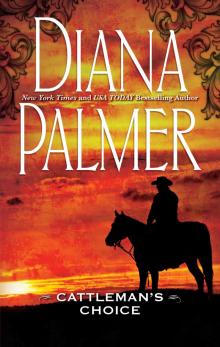 Cattleman's Choice
Cattleman's Choice Mountain Man
Mountain Man Long, Tall and Tempted
Long, Tall and Tempted A Love Like This
A Love Like This Miss Greenhorn
Miss Greenhorn Magnolia
Magnolia Lord of the Desert
Lord of the Desert Wyoming Fierce
Wyoming Fierce True Colors
True Colors Calamity Mom
Calamity Mom The Pursuit
The Pursuit Rogue Stallion
Rogue Stallion Date with a Cowboy
Date with a Cowboy Heart of Winter
Heart of Winter Friends and Lovers
Friends and Lovers Love on Trial
Love on Trial Boss Man
Boss Man Callaghan's Bride
Callaghan's Bride Before Sunrise
Before Sunrise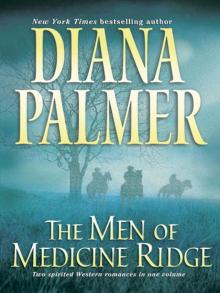 The Men of Medicine Ridge
The Men of Medicine Ridge Texas Proud
Texas Proud Wyoming Tough
Wyoming Tough Passion Flower
Passion Flower Maggie's Dad
Maggie's Dad Donavan
Donavan The Rancher & Heart of Stone
The Rancher & Heart of Stone Long, Tall Texans: Tom
Long, Tall Texans: Tom The Case of the Mesmerizing Boss
The Case of the Mesmerizing Boss Montana Mavericks Weddings
Montana Mavericks Weddings Redbird
Redbird Wyoming Strong
Wyoming Strong Darling Enemy
Darling Enemy Love by Proxy
Love by Proxy Coltrain's Proposal
Coltrain's Proposal The Best Is Yet to Come & Maternity Bride
The Best Is Yet to Come & Maternity Bride Rawhide and Lace
Rawhide and Lace Wyoming Rugged
Wyoming Rugged Patient Nurse
Patient Nurse Undaunted
Undaunted Long Tall Texans Series Book 13 - Redbird
Long Tall Texans Series Book 13 - Redbird Outsider
Outsider Long, Tall Texans: Drew
Long, Tall Texans: Drew Long, Tall Texans--Christopher
Long, Tall Texans--Christopher Merciless
Merciless A Match Made Under the Mistletoe
A Match Made Under the Mistletoe Evan
Evan Hunter
Hunter Now and Forever
Now and Forever Hard to Handle
Hard to Handle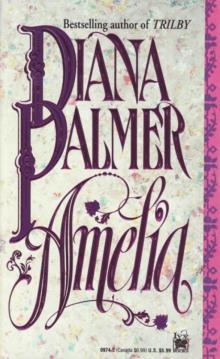 Amelia
Amelia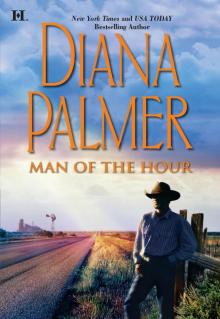 Man of the Hour
Man of the Hour Invincible
Invincible The Maverick
The Maverick Long, Tall Texans--Guy
Long, Tall Texans--Guy Noelle
Noelle Enamored
Enamored The Best Is Yet to Come
The Best Is Yet to Come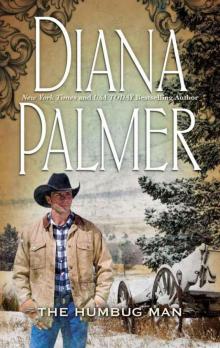 The Humbug Man
The Humbug Man Wyoming Brave
Wyoming Brave Calhoun
Calhoun Long, Tall Texans--Harden
Long, Tall Texans--Harden The Reluctant Father
The Reluctant Father Lawman
Lawman Long, Tall Texans: Hank & Ultimate Cowboy ; Long, Tall Texans: Hank
Long, Tall Texans: Hank & Ultimate Cowboy ; Long, Tall Texans: Hank Grant
Grant Nelson's Brand
Nelson's Brand Wyoming Legend
Wyoming Legend Diamond Spur
Diamond Spur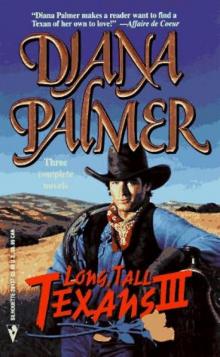 That Burke Man
That Burke Man Wyoming Bold (Mills & Boon M&B)
Wyoming Bold (Mills & Boon M&B) Heartless
Heartless Long, Tall Texans--Luke
Long, Tall Texans--Luke To Have and to Hold
To Have and to Hold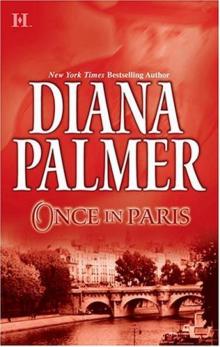 Once in Paris
Once in Paris A Husband for Christmas: Snow KissesLionhearted
A Husband for Christmas: Snow KissesLionhearted Night Fever
Night Fever Beloved
Beloved The Australian
The Australian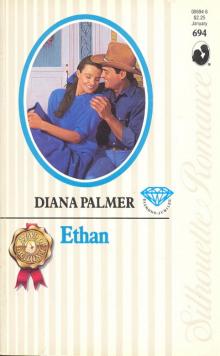 Ethan
Ethan Long, Tall Texans: Jobe
Long, Tall Texans: Jobe Bound by Honor: Mercenary's WomanThe Winter Soldier
Bound by Honor: Mercenary's WomanThe Winter Soldier Tender Stranger
Tender Stranger After Midnight
After Midnight September Morning
September Morning To Wear His Ring
To Wear His Ring Heartbreaker
Heartbreaker Will of Steel
Will of Steel Dangerous
Dangerous Fit for a King
Fit for a King Diamond in the Rough
Diamond in the Rough Matt Caldwell: Texas Tycoon
Matt Caldwell: Texas Tycoon Iron Cowboy
Iron Cowboy Fire And Ice
Fire And Ice Long, Tall Texans--Quinn--A Single Dad Western Romance
Long, Tall Texans--Quinn--A Single Dad Western Romance Montana Mavericks, Books 1-4
Montana Mavericks, Books 1-4 Denim and Lace
Denim and Lace Eye of the Tiger
Eye of the Tiger The Princess Bride
The Princess Bride Long, Tall Texans: Rey ; Long, Tall Texans: Curtis ; A Man of Means ; Garden Cop
Long, Tall Texans: Rey ; Long, Tall Texans: Curtis ; A Man of Means ; Garden Cop Justin
Justin Nora
Nora The Morcai Battalion
The Morcai Battalion Heart of Stone
Heart of Stone The Morcai Battalion: The Recruit
The Morcai Battalion: The Recruit To Love and Cherish
To Love and Cherish Invictus
Invictus Regan's Pride
Regan's Pride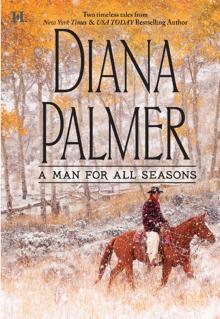 A Man for All Seasons
A Man for All Seasons Sweet Enemy
Sweet Enemy Desperado
Desperado Lacy
Lacy The Winter Man
The Winter Man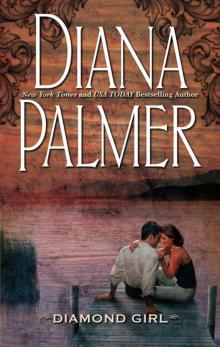 Diamond Girl
Diamond Girl Man of Ice
Man of Ice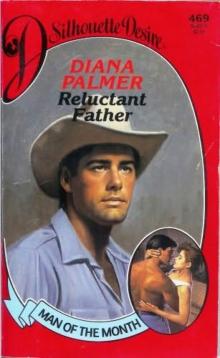 Reluctant Father
Reluctant Father Christmas with My Cowboy
Christmas with My Cowboy Love with a Long, Tall Texan
Love with a Long, Tall Texan Wyoming Bold wm-3
Wyoming Bold wm-3 King's Ransom
King's Ransom Christmas Cowboy
Christmas Cowboy Heart of Ice
Heart of Ice Fearless
Fearless Long, Tall Texans_Hank
Long, Tall Texans_Hank Unbridled
Unbridled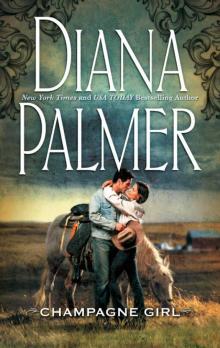 Champagne Girl
Champagne Girl The Greatest Gift
The Greatest Gift Storm Over the Lake
Storm Over the Lake Sutton's Way
Sutton's Way Lionhearted
Lionhearted Renegade
Renegade Betrayed by Love
Betrayed by Love Dream's End
Dream's End All That Glitters
All That Glitters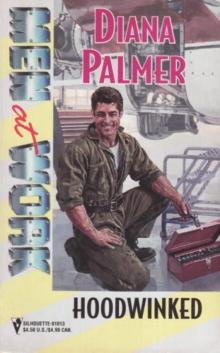 Hoodwinked
Hoodwinked Soldier of Fortune
Soldier of Fortune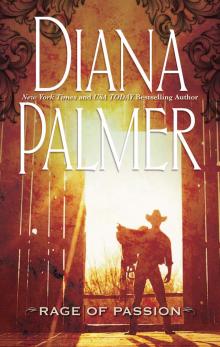 Rage of Passion
Rage of Passion Winter Roses
Winter Roses Rough Diamonds: Wyoming ToughDiamond in the Rough
Rough Diamonds: Wyoming ToughDiamond in the Rough Protector
Protector Emmett
Emmett True Blue
True Blue The Tender Stranger
The Tender Stranger Lone Star Winter
Lone Star Winter Man in Control
Man in Control The Rawhide Man
The Rawhide Man Untamed
Untamed Midnight Rider
Midnight Rider Trilby
Trilby A Long Tall Texan Summer
A Long Tall Texan Summer Tangled Destinies
Tangled Destinies LovePlay
LovePlay Blind Promises
Blind Promises Carrera's Bride
Carrera's Bride Calamity Mum
Calamity Mum Long, Tall Texan Legacy
Long, Tall Texan Legacy Bound by Honor
Bound by Honor Wyoming Winter--A Small-Town Christmas Romance
Wyoming Winter--A Small-Town Christmas Romance Mystery Man
Mystery Man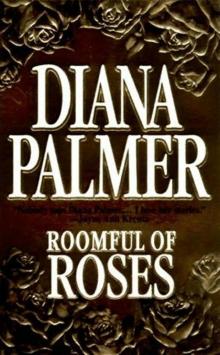 Roomful of Roses
Roomful of Roses Defender
Defender Bound by a Promise
Bound by a Promise Paper Rose
Paper Rose If Winter Comes
If Winter Comes Circle of Gold
Circle of Gold Cattleman's Pride
Cattleman's Pride The Texas Ranger
The Texas Ranger Lady Love
Lady Love Unlikely Lover
Unlikely Lover A Man of Means
A Man of Means The Snow Man
The Snow Man The Case of the Missing Secretary
The Case of the Missing Secretary Harden
Harden Tough to Tame
Tough to Tame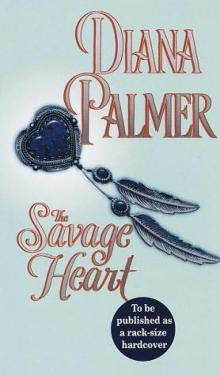 The Savage Heart
The Savage Heart